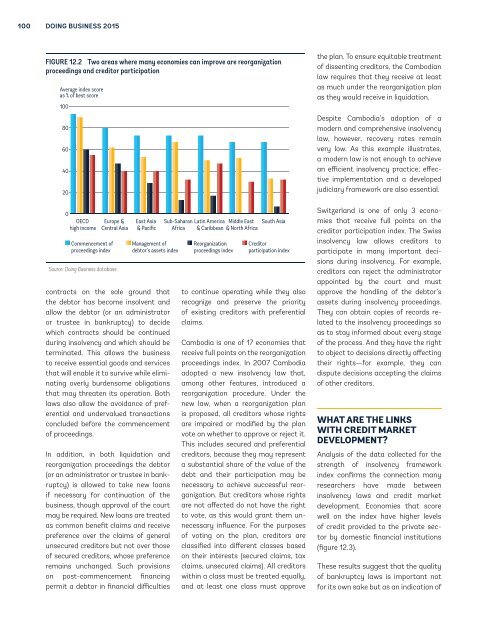bc8G2-7
bc8G2-7
bc8G2-7
You also want an ePaper? Increase the reach of your titles
YUMPU automatically turns print PDFs into web optimized ePapers that Google loves.
100<br />
DOING BUSINESS 2015<br />
FIGURE 12.2 Two areas where many economies can improve are reorganization<br />
proceedings and creditor participation<br />
Average index score<br />
as % of best score<br />
100<br />
80<br />
60<br />
40<br />
20<br />
0<br />
OECD<br />
high income<br />
Commencement of<br />
proceedings index<br />
Europe &<br />
Central Asia<br />
Source: Doing Business database.<br />
East Asia<br />
& Pacific<br />
Management of<br />
debtor’s assets index<br />
contracts on the sole ground that<br />
the debtor has become insolvent and<br />
allow the debtor (or an administrator<br />
or trustee in bankruptcy) to decide<br />
which contracts should be continued<br />
during insolvency and which should be<br />
terminated. This allows the business<br />
to receive essential goods and services<br />
that will enable it to survive while eliminating<br />
overly burdensome obligations<br />
that may threaten its operation. Both<br />
laws also allow the avoidance of preferential<br />
and undervalued transactions<br />
concluded before the commencement<br />
of proceedings.<br />
In addition, in both liquidation and<br />
reorganization proceedings the debtor<br />
(or an administrator or trustee in bankruptcy)<br />
is allowed to take new loans<br />
if necessary for continuation of the<br />
business, though approval of the court<br />
may be required. New loans are treated<br />
as common benefit claims and receive<br />
preference over the claims of general<br />
unsecured creditors but not over those<br />
of secured creditors, whose preference<br />
remains unchanged. Such provisions<br />
on post-commencement financing<br />
permit a debtor in financial difficulties<br />
Sub-Saharan Latin America Middle East<br />
Africa & Caribbean & North Africa<br />
Reorganization<br />
proceedings index<br />
South Asia<br />
Creditor<br />
participation index<br />
to continue operating while they also<br />
recognize and preserve the priority<br />
of existing creditors with preferential<br />
claims.<br />
Cambodia is one of 17 economies that<br />
receive full points on the reorganization<br />
proceedings index. In 2007 Cambodia<br />
adopted a new insolvency law that,<br />
among other features, introduced a<br />
reorganization procedure. Under the<br />
new law, when a reorganization plan<br />
is proposed, all creditors whose rights<br />
are impaired or modified by the plan<br />
vote on whether to approve or reject it.<br />
This includes secured and preferential<br />
creditors, because they may represent<br />
a substantial share of the value of the<br />
debt and their participation may be<br />
necessary to achieve successful reorganization.<br />
But creditors whose rights<br />
are not affected do not have the right<br />
to vote, as this would grant them unnecessary<br />
influence. For the purposes<br />
of voting on the plan, creditors are<br />
classified into different classes based<br />
on their interests (secured claims, tax<br />
claims, unsecured claims). All creditors<br />
within a class must be treated equally,<br />
and at least one class must approve<br />
the plan. To ensure equitable treatment<br />
of dissenting creditors, the Cambodian<br />
law requires that they receive at least<br />
as much under the reorganization plan<br />
as they would receive in liquidation.<br />
Despite Cambodia’s adoption of a<br />
modern and comprehensive insolvency<br />
law, however, recovery rates remain<br />
very low. As this example illustrates,<br />
a modern law is not enough to achieve<br />
an efficient insolvency practice; effective<br />
implementation and a developed<br />
judiciary framework are also essential.<br />
Switzerland is one of only 3 economies<br />
that receive full points on the<br />
creditor participation index. The Swiss<br />
insolvency law allows creditors to<br />
participate in many important decisions<br />
during insolvency. For example,<br />
creditors can reject the administrator<br />
appointed by the court and must<br />
approve the handling of the debtor’s<br />
assets during insolvency proceedings.<br />
They can obtain copies of records related<br />
to the insolvency proceedings so<br />
as to stay informed about every stage<br />
of the process. And they have the right<br />
to object to decisions directly affecting<br />
their rights—for example, they can<br />
dispute decisions accepting the claims<br />
of other creditors.<br />
WHAT ARE THE LINKS<br />
WITH CREDIT MARKET<br />
DEVELOPMENT?<br />
Analysis of the data collected for the<br />
strength of insolvency framework<br />
index confirms the connection many<br />
researchers have made between<br />
insolvency laws and credit market<br />
development. Economies that score<br />
well on the index have higher levels<br />
of credit provided to the private sector<br />
by domestic financial institutions<br />
(figure 12.3).<br />
These results suggest that the quality<br />
of bankruptcy laws is important not<br />
for its own sake but as an indication of


